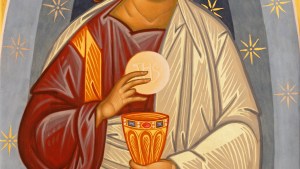Lenten Campaign 2025
This content is free of charge, as are all our articles.
Support us with a donation that is tax-deductible and enable us to continue to reach millions of readers.
The Catholic Church firmly believes that the Eucharist is Jesus himself hidden under the appearances of bread and wine. We believe, as the Catechism states, that “In the most blessed sacrament of the Eucharist ‘the body and blood, together with the soul and divinity, of our Lord Jesus Christ and, therefore, the whole Christ is truly, really, and substantially contained’” (CCC 1374).
This teaching has not changed over the centuries and has been taught since the beginning of Christianity.
For example, St. Justin Martyr wrote his famous First Apology in the 2nd century, in which he defends the early Christian belief in the Eucharist.
St. Justin lived between 100 and 165 and was a philosopher and Christian apologist. He desired greatly to share his newfound Christian faith and to explain it in a way that would be understood by the pagans of the Roman Empire.
He proceeded to submit an account of Christian worship to the Roman Emperor in order to clear up many misconceptions.
In his defense, St. Justin wrote plainly about the Eucharist and made sure to note that it is not ordinary bread:
And this food is called among us Εὐχαριστία [the Eucharist], of which no one is allowed to partake but the man who believes that the things which we teach are true, and who has been washed with the washing that is for the remission of sins, and unto regeneration, and who is so living as Christ has enjoined.
For not as common bread and common drink do we receive these; but in like manner as Jesus Christ our Savior, having been made flesh by the Word of God, had both flesh and blood for our salvation, so likewise have we been taught that the food which is blessed by the prayer of His word, and from which our blood and flesh by transmutation are nourished, is the flesh and blood of that Jesus who was made flesh.
He continues his defense by tracing the early Church’s belief to the Gospels:
For the apostles, in the memoirs composed by them, which are called Gospels, have thus delivered unto us what was enjoined upon them; that Jesus took bread, and when He had given thanks, said, “This do in remembrance of Me, this is My body”; and that, after the same manner, having taken the cup and given thanks, He said, “This is My blood”; and gave it to them alone.
While the Church’s belief in the Eucharist may seem at times like a medieval invention, it has its roots in the Gospels and in the beliefs of early Christians.



